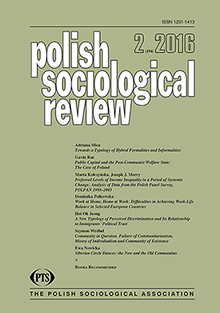Work at Home, Home at Work: Difficulties in Achieving Work-Life Balance in Selected European Countries
Work at Home, Home at Work: Difficulties in Achieving Work-Life Balance in Selected European Countries
Author(s): Dominika PolkowskaSubject(s): Social Sciences, Sociology
Published by: Polskie Towarzystwo Socjologiczne
Keywords: Work-life balance; general family support model; dual earner; work-to-home conflict; paternalistic-market model
Summary/Abstract: The work-family balance is a state of globally assessed equilibrium in which labour resources enable employees to meet the requirements and expectations of the family, while family resources enable family members to meet the requirements and expectations of the work, making it possible to act effectively in both areas.The aim of this paper is to demonstrate that the problem of reconciling work and family life is of global reach (and particularly acute in Western societies). Also, to present differences between selected countries in this aspect. Our hypothesis assumes that, taking work-life balance into consideration, Poland is in the worst situation among these countries.Following Korpi's classification, the countries we have selected for the analysis are: Germany, Belgium (examples of the general family support model), Sweden, Finland (the dual earner support model) and the United Kingdom (the market-oriented model). Although Poland is not present in Korpi's classification, we include it in our analysis as an example of a different model, not mentioned by Korpi, namely, the paternalistic-market model.
Journal: Polish Sociological Review
- Issue Year: 194/2016
- Issue No: 2
- Page Range: 191-208
- Page Count: 17
- Language: English

